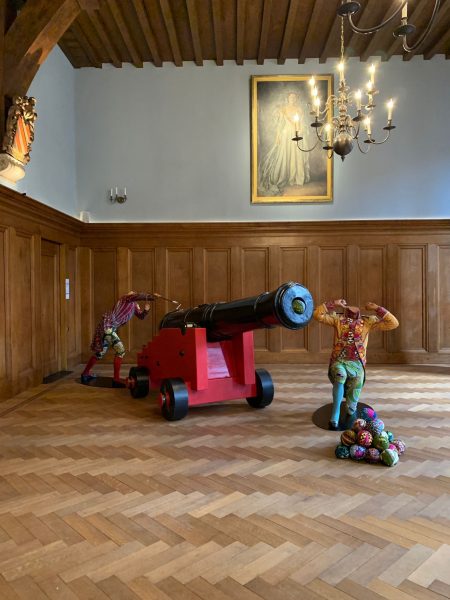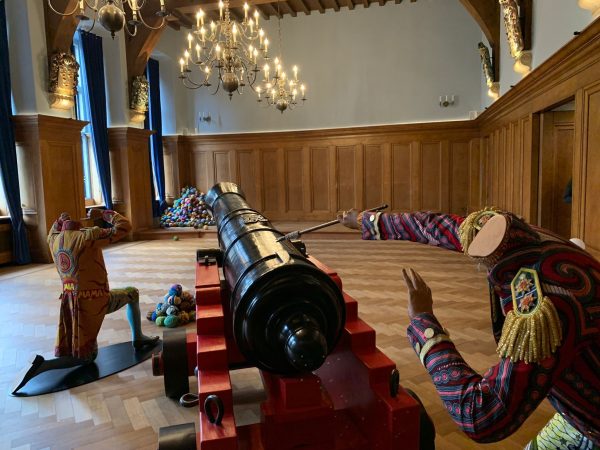Het werk Cannonball Heaven (2011) van de Brits-Afrikaanse kunstenaar Yinka Shonibare kun je in de landelijke Museumweek van zaterdag 30 maart t/m woensdag 24 april bewonderen in de Ridderzaal van het kasteel. Dit prachtige kunstwerk is besproken door Lucas de Man in het tv-programma Man en Kunst op vrijdag 5 april om 22:10 op NPO2. Het kunstwerk was eerder te zien in een solo tentoonstelling over het werk van Shonibare, daarna is het kunstwerk aangekocht door het museum.
Let op: vanwege meerdere evenementen in de Ridderzaal in de periode tot en met 24 april, is het kunstwerk niet te zien op de volgende data en tijden: 12 april 12:00 -13:00, 13 april 14:00-17:00, 16 april 10:00- 14:00, 19 april 11:00-15:00, 25 april 10:00 -11:00 en 5 mei 14:00-17:00.

Cannonball Heaven
Parallel met vandaag de dag
Het kunstwerk verwijst naar de koloniale tijd, maar trekt daarnaast ook een parallel met de huidige maatschappij. Het werk bestaat uit een kanon, twee figuren (twee marine-officieren) die samen kanonskogels afvuren naar een hoek van de zaal. Daar is een grote berg met kanonskogels van Vlisco-stoffen te zien. Het kanon is een replica van de exemplaren die meevoeren met de HMS Victory. Doordat de kanonskogels van stof zijn, als een soort speelgoed, wordt de macht van het Britse rijk geneutraliseerd en verzacht. Het is in die zin een onmogelijke situatie: oorlog wordt gesuggereerd, maar het is onmogelijk deze te realiseren. De macht, gesymboliseerd door deze stoffen kanonskogels, is impotent.
Oorlog & conflict
Het werk bekritiseert de redenen waarom oorlog wordt gevoerd. Shonibare stelt dat oorlogen zelden daadwerkelijk gevoerd worden om mensenrechten te verbeteren, zoals vaak als reden wordt opgegeven. De verwijzing naar de HMS Victory is dan ook een concreet voorbeeld van de Britse macht over zee, waar de belangrijkste handel werd gevoerd en wat in de geschiedenis van dit eiland een belangrijke rol vervult. In werkelijkheid werden deze oorlogen meestal gevoerd om macht en territoriaal gebied veilig te stellen, of vanwege economische agenda’s. Dit illustreert de actualiteit van het werk van Yinka Shonibare. Hij trekt parallellen tussen het heden en verleden. De expansiedrang uit het verleden zien we namelijk ook terug in onze tijd, met oorlogen, vluchtelingenstromen en andere humanitaire crises tot gevolg. Yinka Shonibare maakt ons zo bewust van deze motieven en hun gevolgen en bevraagt deze. Zijn werk functioneert zo als beginpunt voor discussies over actuele onderwerpen.

Lord Nelson, bron van fascinatie voor Shonibare
Cannonball Heaven maakt deel uit van een groter thema binnen het werk van Yinka Shonibare: zijn fascinatie voor Lord Nelson, de aanvoerder van de HMS Victory, en de belangrijke rol die deze figuur speelde binnen de koloniale geschiedenis. Lord Nelson staat voor alle koloniale wereldmachten in het werk van Shonibare. Zo toont hij in de Fake Death Pictures (2011) hoe Lord Nelson stierf en bezingt in Addio del Passato (2011) zijn vrouw Frances de trieste verhouding die zij met hem had. Zo maakt hij de gevolgen van het kolonialisme voor het heden op een poëtische manier zichtbaar.
Cannonball Heaven kwam voort uit het onderzoek dat Shonibare deed voor zijn inzending voor de Fourth Plinth competitie, wat resulteerde in zijn publieke doorbraak: Nelson´s Ship in a Bottle (2010). Dit werk bestaat uit een replica van de HMS Victory in een glazen fles, dat van mei 2010 tot januari 2012 te zien was op Trafalgar Square in Londen en nu in het bezit is van het Londense National Maritime Museum. Cannonball Heaven verwijst in wezen niet alleen naar de koloniale geschiedenis van Groot Brittannië, maar ook die van landen als Spanje, Portugal en Nederland. Het is dan ook niet vreemd dat de stad Madrid de productiekosten voor dit werk mede financierde ten behoeve van een reizende tentoonstelling van hem in Spanje.


